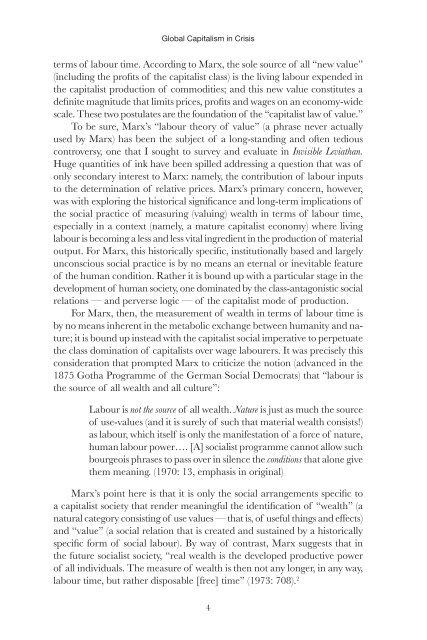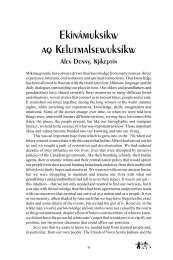The Global Economic Crisis — A Marxist Perspective - Fernwood ...
The Global Economic Crisis — A Marxist Perspective - Fernwood ...
The Global Economic Crisis — A Marxist Perspective - Fernwood ...
You also want an ePaper? Increase the reach of your titles
YUMPU automatically turns print PDFs into web optimized ePapers that Google loves.
<strong>Global</strong> Capitalism in <strong>Crisis</strong><br />
terms of labour time. According to Marx, the sole source of all “new value”<br />
(including the profits of the capitalist class) is the living labour expended in<br />
the capitalist production of commodities; and this new value constitutes a<br />
definite magnitude that limits prices, profits and wages on an economy-wide<br />
scale. <strong>The</strong>se two postulates are the foundation of the “capitalist law of value.”<br />
To be sure, Marx’s “labour theory of value” (a phrase never actually<br />
used by Marx) has been the subject of a long-standing and often tedious<br />
controversy, one that I sought to survey and evaluate in Invisible Leviathan.<br />
Huge quantities of ink have been spilled addressing a question that was of<br />
only secondary interest to Marx: namely, the contribution of labour inputs<br />
to the determination of relative prices. Marx’s primary concern, however,<br />
was with exploring the historical significance and long-term implications of<br />
the social practice of measuring (valuing) wealth in terms of labour time,<br />
especially in a context (namely, a mature capitalist economy) where living<br />
labour is becoming a less and less vital ingredient in the production of material<br />
output. For Marx, this historically specific, institutionally based and largely<br />
unconscious social practice is by no means an eternal or inevitable feature<br />
of the human condition. Rather it is bound up with a particular stage in the<br />
development of human society, one dominated by the class-antagonistic social<br />
relations <strong>—</strong> and perverse logic <strong>—</strong> of the capitalist mode of production.<br />
For Marx, then, the measurement of wealth in terms of labour time is<br />
by no means inherent in the metabolic exchange between humanity and nature;<br />
it is bound up instead with the capitalist social imperative to perpetuate<br />
the class domination of capitalists over wage labourers. It was precisely this<br />
consideration that prompted Marx to criticize the notion (advanced in the<br />
1875 Gotha Programme of the German Social Democrats) that “labour is<br />
the source of all wealth and all culture”:<br />
Labour is not the source of all wealth. Nature is just as much the source<br />
of use-values (and it is surely of such that material wealth consists!)<br />
as labour, which itself is only the manifestation of a force of nature,<br />
human labour power…. [A] socialist programme cannot allow such<br />
bourgeois phrases to pass over in silence the conditions that alone give<br />
them meaning. (1970: 13, emphasis in original)<br />
Marx’s point here is that it is only the social arrangements specific to<br />
a capitalist society that render meaningful the identification of “wealth” (a<br />
natural category consisting of use values <strong>—</strong> that is, of useful things and effects)<br />
and “value” (a social relation that is created and sustained by a historically<br />
specific form of social labour). By way of contrast, Marx suggests that in<br />
the future socialist society, “real wealth is the developed productive power<br />
of all individuals. <strong>The</strong> measure of wealth is then not any longer, in any way,<br />
labour time, but rather disposable [free] time” (1973: 708). 2<br />
4





